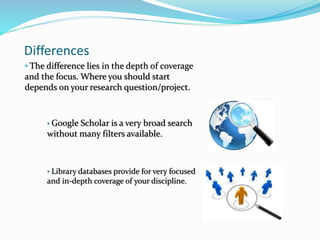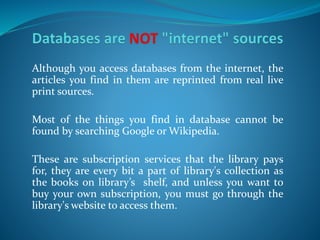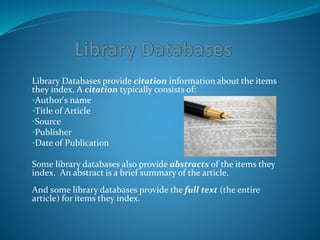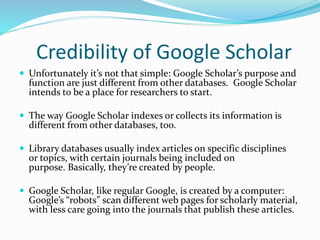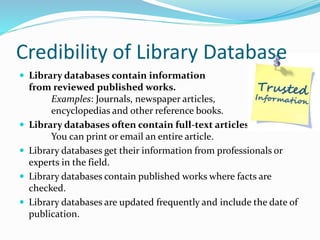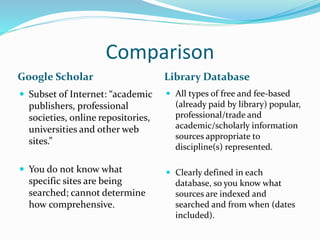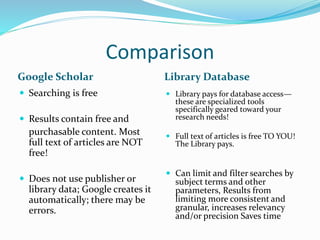Library Database and Google Scholar
- 2. Definition ’éŚ A library database is an online resource that the library subscribes to that contains articles and information from print sources such as magazines, newspapers, journals, and reference books. ’éŚ Google Scholar is a Web search engine that specifically searches scholarly literature and academic resources.
- 3. Differences ŌĆó The difference lies in the depth of coverage and the focus. Where you should start depends on your research question/project. ŌĆó Google Scholar is a very broad search without many filters available. ŌĆó Library databases provide for very focused and in-depth coverage of your discipline.
- 4. Although you access databases from the internet, the articles you find in them are reprinted from real live print sources. Most of the things you find in database cannot be found by searching Google or Wikipedia. These are subscription services that the library pays for, they are every bit a part of library's collection as the books on libraryŌĆÖs shelf, and unless you want to buy your own subscription, you must go through the library's website to access them.
- 5. Library Databases provide citation information about the items they index. A citation typically consists of: ŌĆóAuthor's name ŌĆóTitle of Article ŌĆóSource ŌĆóPublisher ŌĆóDate of Publication Some library databases also provide abstracts of the items they index. An abstract is a brief summary of the article. And some library databases provide the full text (the entire article) for items they index.
- 6. Google Scholar ’éŚ Google Scholar allows users to search for digital or physical copies of articles, whether online or in libraries. ’éŚ It indexes "full-text journal articles, technical reports, preprints, theses, books, and other documents, including selected Web pages that are deemed to be ŌĆśscholarlyŌĆÖ ŌĆØ.
- 7. Credibility of Google Scholar ’éŚ Unfortunately itŌĆÖs not that simple: Google ScholarŌĆÖs purpose and function are just different from other databases. Google Scholar intends to be a place for researchers to start. ’éŚ The way Google Scholar indexes or collects its information is different from other databases, too. ’éŚ Library databases usually index articles on specific disciplines or topics, with certain journals being included on purpose. Basically, theyŌĆÖre created by people. ’éŚ Google Scholar, like regular Google, is created by a computer: GoogleŌĆÖs ŌĆ£robotsŌĆØ scan different web pages for scholarly material, with less care going into the journals that publish these articles.
- 8. Limitation of Google Scholar ’éŚ Google Scholar will not contain everything that is in the Library's databases. ’éŚ Google Scholar can be a convenient starting place, but it is not a comprehensive "one-stop shop."
- 9. ’éŚ Library databases contain information from reviewed published works. Examples: Journals, newspaper articles, encyclopedias and other reference books. ’éŚ Library databases often contain full-text articles. You can print or email an entire article. ’éŚ Library databases get their information from professionals or experts in the field. ’éŚ Library databases contain published works where facts are checked. ’éŚ Library databases are updated frequently and include the date of publication. Credibility of Library Database
- 10. Comparison Google Scholar Library Database ’éŚ Subset of Internet: ŌĆ£academic publishers, professional societies, online repositories, universities and other web sites.ŌĆØ ’éŚ You do not know what specific sites are being searched; cannot determine how comprehensive. ’éŚ All types of free and fee-based (already paid by library) popular, professional/trade and academic/scholarly information sources appropriate to discipline(s) represented. ’éŚ Clearly defined in each database, so you know what sources are indexed and searched and from when (dates included).
- 11. Comparison Google Scholar Library Database ’éŚ Searching is free ’éŚ Results contain free and purchasable content. Most full text of articles are NOT free! ’éŚ Does not use publisher or library data; Google creates it automatically; there may be errors. ’éŚ Library pays for database accessŌĆö these are specialized tools specifically geared toward your research needs! ’éŚ Full text of articles is free TO YOU! The Library pays. ’éŚ Can limit and filter searches by subject terms and other parameters, Results from limiting more consistent and granular, increases relevancy and/or precision Saves time
- 12. Conclusion ’éŚ Google Scholar gives the researcher the advantage of being able to follow a hunch and look up information on the fly. The information can later be verified or discredited when researched in greater depth, as the potential for encountering incorrect statistics and other false information is high. ’éŚ Library database often have valuable primary sources such as original diaries, newspapers and maps. Comparatively few primary sources are on the Google Scholar compared with what is available in libraries database.
- 13. Library database also offer expert assistance to researchers. If you are having difficulty locating what you need for your research, an effective librarian can help you find it Library database often offer databases that their patrons can use for free. If you do not want to pay for an expensive subscription to a database or pay per article download, the library can save you a significant amount of money.



